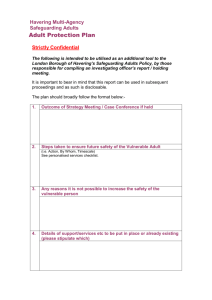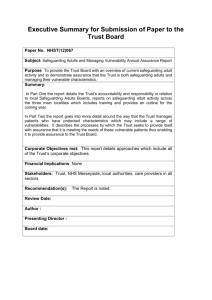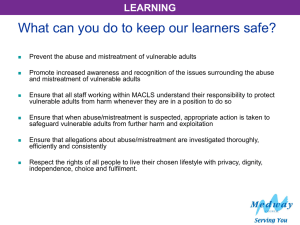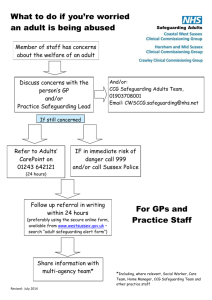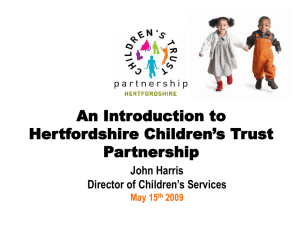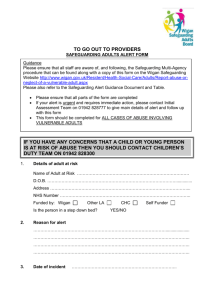Guidance Notes for Safeguarding Children and Vulnerable Adults
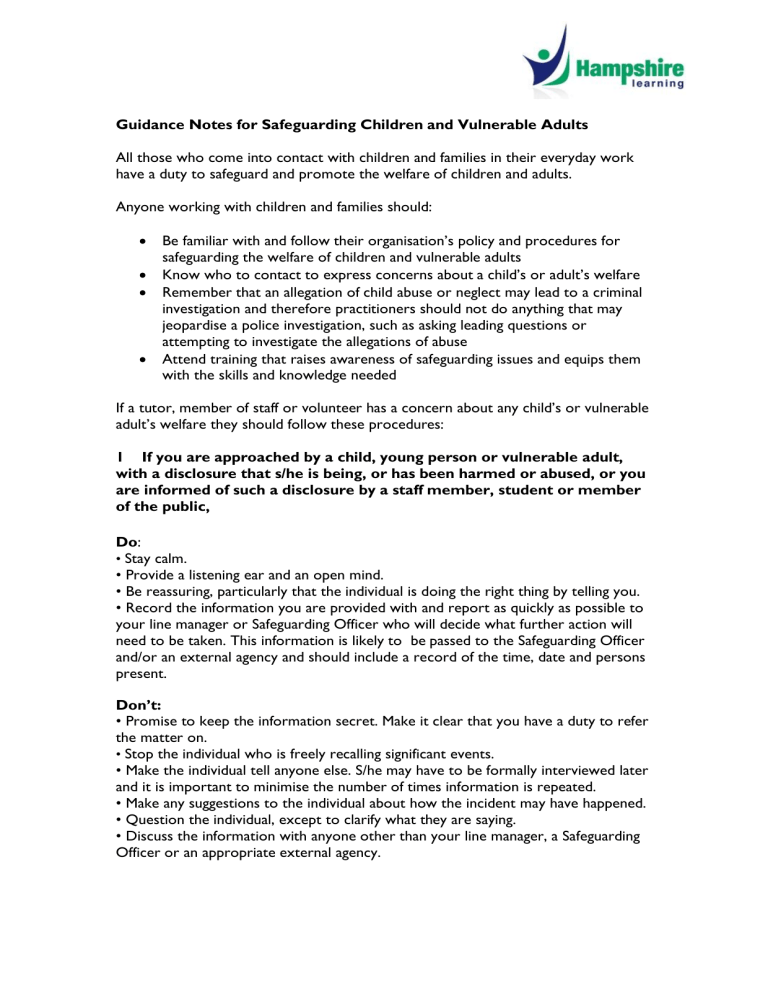
Guidance Notes for Safeguarding Children and Vulnerable Adults
All those who come into contact with children and families in their everyday work have a duty to safeguard and promote the welfare of children and adults.
Anyone working with children and families should:
Be familiar with and follow their organisation’s policy and procedures for safeguarding the welfare of children and vulnerable adults
Know who to contact to express concerns about a child’s or adult’s welfare
Remember that an allegation of child abuse or neglect may lead to a criminal investigation and therefore practitioners should not do anything that may jeopardise a police investigation, such as asking leading questions or attempting to investigate the allegations of abuse
Attend training that raises awareness of safeguarding issues and equips them with the skills and knowledge needed
If a tutor, member of staff or volunteer has a concern about any child’s or vulnerable adult’s welfare they should follow these procedures:
1 If you are approached by a child, young person or vulnerable adult, with a disclosure that s/he is being, or has been harmed or abused, or you are informed of such a disclosure by a staff member, student or member of the public,
Do:
• Stay calm.
• Provide a listening ear and an open mind.
• Be reassuring, particularly that the individual is doing the right thing by telling you.
• Record the information you are provided with and report as quickly as possible to your line manager or Safeguarding Officer who will decide what further action will need to be taken. This information is likely to be passed to the Safeguarding Officer and/or an external agency and should include a record of the time, date and persons present.
Don’t:
• Promise to keep the information secret. Make it clear that you have a duty to refer the matter on.
• Stop the individual who is freely recalling significant events.
• Make the individual tell anyone else. S/he may have to be formally interviewed later and it is important to minimise the number of times information is repeated.
• Make any suggestions to the individual about how the incident may have happened.
• Question the individual, except to clarify what they are saying.
• Discuss the information with anyone other than your line manager, a Safeguarding
Officer or an appropriate external agency.
2 If you are concerned that a child, young person or vulnerable adult is, or may be subject to, abuse or harm:
• make a written, dated note of observations.
• inform your line manager or Safeguarding Officer as soon as possible, who will, within the appropriate timeframe, either make enquiries without raising the question of abuse and evaluate the matter and/or make a referral to the
Safeguarding Officer and/or appropriate external authority. See below for
referral procedure.
3. The following outlines the steps you should take if you are concerned that the behaviour of a member of staff or other person is threatening, or potentially threatening, the well-being of a child, young person or vulnerable adult.
If you are concerned that a member of staff is harming or abusing a child or vulnerable adult, you must report your concerns immediately to the Designated
Senior Officer Where it is appropriate to do so, relevant Human Resources
Service procedures may be initiated and/or a referral made to an external agency.
If you suspect any other person is harming or abusing a child or vulnerable adult, you should contact your line manager or Safeguarding Officer. However, you can contact Children’s Services, Adult Services or the police.
In all situations, you may be asked to provide an outline of your concerns in writing.
If the matter is referred to Children’s Service, Adult Services or the police, you may be asked to provide a formal statement of your concerns for subsequent external investigations.
If you have urgent concerns about the safety of a child or vulnerable adult and are unable to contact your line manager or Safeguarding Officer, do not hesitate to contact Children’s Services, Adult Services or the police These external agencies will be in a position to determine an appropriate course of action.
Making a Referral
If you are concerned that a child or vulnerable adult may be at risk or has disclosed that they are being harmed, you should contact your line manager or Safeguarding
Officer.
Your line manager or Safeguarding Officer will assess the concerns to determine whether an external referral to Children’s Services, Adult Services or the police needs to take place, or can be addressed via the County’s internal procedures.
Where a referral is to be made externally, the appointed officer will report the matter to the Children’s Services or Adult Services, and/or to the police. The external agency will conduct their own investigation with regard to their policies and guidelines. Anonymity may not be maintained on reporting.
What to do if you have concerns for the safety of a child or vulnerable adult or in the case of allegations about a member of staff
You are approached by a child or vulnerable adult with a disclosure that s/he is being, or has been harmed or abused or neglected or you are informed of such a disclosure by a staff member, learner or member of the public or
You are concerned that a child or vulnerable adult is, or may be subject to, abuse or harm.
Make a written note of the information/ observation, and include a record of the time, date and persons present.
If line manager not available contact the
Inform your line manager as soon as possible.
Safeguarding
Officer or
Children’s or
Adult Services for the appropriate area.
You are concerned that the behaviour of a member of staff or other person is threatening, or potentially threatening, the well-being of a child or vulnerable adult. formal statement of your concerns for subsequent external investigations.
Line manager will evaluate the incident and/or make a referral to the appropriate internal officer or external agency.
Report your concerns immediately to the
Designated Senior Officer (for Children’s
Services staff) or the Local Authority
Designated Officer (for other local authority establishments)
Where appropriate, relevant Human Resources
Service procedures may be initiated and/or a referral made to an external agency.
In all situations, you must provide an outline of your concerns in writing. If the matter is referred to Children’s Services, Adult Services or the police, you may be asked to provide a
NB: If you have immediate concerns that a child or vulnerable adult is at risk of significant harm contact Children’s Services or
Adult Services. If you think a criminal offence has been committed contact the police.
4 Contact details
If you become aware of concerns that a child or vulnerable adult is being abused, or if you have any concerns, you must report it to your line manager. If you think someone is being abused, don’t assume that someone else is doing something about it.
If you need to contact Children’s Services or Adult Services, use the phone numbers below:
Children’s
Services:
0845 603 5620
Monday - Thursday 8.30am to 5pm
Fridays 8.30am to 4.30pm
All other times and for Weekends and Bank Holidays please use the Out of Hours number
Out of hours:
0845 600 45 55
Monday - Thursday 5pm to 8.30 am.
Friday 4.30 pm to Monday 08.30 am.
All day on Bank Holidays and Christmas Day.
The helpline is staffed by social workers and other specialists who can deal with anything.
Adult
Services: see call
Monday - Thursday 8.30am to 5pm
0845 603 5630
Fridays 8.30am to 4.30pm
All other times and for Weekends and Bank Holidays please use the Out of Hours number charges
Out of hours:
0845 600 45
55
Monday - Thursday 5pm to 8.30 am.
Friday 4.30 pm to Monday 08.30 am.
All day on Bank Holidays and Christmas Day.
The helpline is staffed by social workers and other specialists who can deal with anything from advice about how best to help an elderly relative to getting help in an emergency.
If you believe a crime has been committed, or the child or vulnerable person is in immediate danger contact your local police on 0845 045 45 45
Where there are concerns or specific allegations about the conduct of a member of staff or a volunteer, the line manager should contact a senior officer who will liaise with the Local Authority Designated Officer (LADO) who is the single point of
contact on such issues. It is the responsibility of the LADO to liaise with other agencies such as Human Resources or the police in appropriate cases.
The Local Authority Designated Officer (LADO) for Allegations is:
Barbara Piddington
Telephone: 01962 876265
E-mail: barbara.piddington@hants.gov.uk
Address:
The Safeguarding Unit
Children’s Services Department
Clarendon House, Monarch Way
Winchester SO22 5PW
The LADO should be advised of all cases where it is alleged that a person who works with children has:
behaved in a way that has harmed, or may have harmed, a child
possibly committed a criminal offence against, or related to, a child; or behaved towards a child or children in a way that indicated s/he is unsuitable to work with children.
For allegations involving staff working with vulnerable adults the contact is:
Jane Selvage
Strategic Services Manager Safeguarding
Adult Services
Telephone: 01962 845514 Email: jane.selvage@hants.gov.uk
5 Practitioners’ Guide on Information Sharing
You should explain to children, young people and families at the outset, openly and honestly, what and how information will or could be shared. You should seek their agreement. The exception to this is where to do so would put that child, vulnerable adult or others at increased risk of significant harm.
You must always consider the safety and welfare of a individual when making decisions on whether to share information about them. Where there is concern that the individual may be suffering or is at risk of suffering significant harm, the individual’s safety and welfare must be the overriding consideration.
You should, where possible, respect the wishes of children, young people or families who do not consent to share confidential information. You may still share information, if in your judgement there is sufficient need in the public interest to override that lack of consent.
You should seek advice where you are in doubt.
You should ensure that the information you share is accurate and up-to-date.
You should always record the reasons for your decision, whether it is to share information or not.
These guidance notes have been taken from the Every Child Matters Government
Guidance ‘what to do if you are worried a child is being abused’
NSPCC Child Protection Line 0808 800 5000
